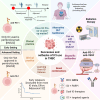Recent Advances in Immune Checkpoint Inhibitors for Triple-Negative Breast Cancer
- PMID: 40196378
- PMCID: PMC11974553
- DOI: 10.2147/ITT.S495751
Recent Advances in Immune Checkpoint Inhibitors for Triple-Negative Breast Cancer
Abstract
While immunotherapy has transformed treatment across various cancers, its impact on breast cancer is relatively limited. Recent advances have established immunotherapy as an effective approach for triple-negative breast cancer (TNBC), an aggressive subtype with limited therapeutic targets and poor prognosis. Specifically, pembrolizumab, an immune checkpoint inhibitor (ICI), is now approved for both first-line metastatic and early-stage TNBC. In metastatic TNBC, combining ICIs with chemotherapy, particularly pembrolizumab, has demonstrated survival benefits in patients with PD-L1-positive disease. However, extending these benefits to broader populations has proven challenging, highlighting the need for better patient selection and novel strategies. Emerging approaches include combining ICIs with antibody-drug conjugates, PARP inhibitors, dual ICIs, and bispecific antibodies targeting angiogenesis and immune checkpoints. These strategies aim to overcome resistance and expand immunotherapy's efficacy beyond the PD-1/PD-L1 pathway. In early-stage disease, pembrolizumab combined with chemotherapy in the neoadjuvant setting has significantly improved pathologic complete response, event-free survival, and overall survival, establishing a new standard of care. Ongoing research aims to determine the optimal timing for ICI administration, explore less toxic chemotherapy backbones, utilize biomarkers for personalized treatment, and assess whether adding complementary treatments, such as radiation therapy for high-risk cases, can improve outcomes. This review examines the successes and setbacks of ICI use in TNBC, offering a comprehensive overview of current practices and future directions. It emphasizes optimizing ICI timing, leveraging biomarkers, and integrating novel agents to refine treatment approaches for both metastatic and early-stage TNBC. As immunotherapy continues to evolve, future research must address the unmet needs of this challenging breast cancer subtype, offering hope for improved outcomes.
Keywords: biomarker; breast cancer; drug development; immunotherapy; precision medicine.
© 2025 Corti et al.
Conflict of interest statement
CCo reports travel/accommodations (to scientific meeting) from Veracyte (2023), and is supported by the Fondazione Gianni Bonadonna (FGB) and Associazione Italiana per la Ricerca contro il Cancro (AIRC) (2024-2026). All the competing interests were outside the submitted work. BK and TR have no potential conflicts of interest to disclose. EAM reports compensated service on scientific advisory boards for AstraZeneca, BioNTech, Merck and Moderna; uncompensated service on steering committees for Bristol Myers Squibb and Roche/Genentech; speakers honoraria and travel support from Merck Sharp & Dohme; and institutional research support from Roche/Genentech (via SU2C grant) and Gilead. EAM also reports research funding from Susan Komen for the Cure for which she serves as a Scientific Advisor, and uncompensated participation as a member of the American Society of Clinical Oncology Board of Directors. All the competing interests were outside the submitted work. SMT reports a consulting or advisory role for Novartis, Pfizer (SeaGen), Merck, Eli Lilly, AstraZeneca, Genentech/Roche, Eisai, Sanofi, Bristol Myers Squibb/Systimmune, Daiichi Sankyo, Gilead, Zymeworks, Zentalis, Blueprint Medicines, Reveal Genomics, Sumitovant Biopharma, Artios Pharma, Menarini/Stemline, Aadi Bio, Bayer, Incyte Corp, Jazz Pharmaceuticals, Natera, Tango Therapeutics, eFFECTOR, Hengrui USA, Cullinan Oncology, Circle Pharma, Arvinas, BioNTech, Johnson&Johnson/Ambrx, Launch Therapeutics, Zuellig Pharma, Bicycle Therapeutics, BeiGene Therapeutics, Mersana, Summit Therapeutics; reports institutional research funding from Genentech/Roche, Merck, Exelixis, Pfizer, Lilly, Novartis, Bristol Myers Squibb, Eisai, AstraZeneca, Gilead, NanoString Technologies, Seattle Genetics, OncoPep, Daiichi Sankyo, Menarini/Stemline, Jazz Pharmaceuticals; and receives travel support from Eli Lilly, Sanofi, Gilead, Jazz Pharmaceuticals, Pfizer, Arvinas. All the competing interests were outside the submitted work.
Figures
References
Publication types
LinkOut - more resources
Full Text Sources
Research Materials


